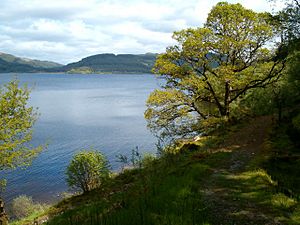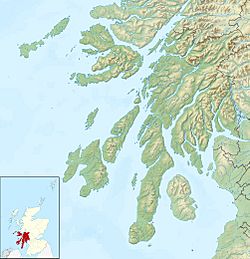Loch Avich facts for kids
Quick facts for kids Loch Avich |
|
|---|---|
| Avich loch | |

Loch Avich
|
|
| Location | Argyll and Bute, Scotland |
| Coordinates | 56°16′40″N 5°20′08″W / 56.2779°N 5.3355°W |
| Type | freshwater loch |
| Primary outflows | River Avich |
| Basin countries | Scotland |
| Max. length | 3.3 mi (5.3 km) |
| Max. width | 0.5 mi (0.80 km) |
| Surface area | 348.2 ha (860 acres) |
| Average depth | 98.5 ft (30.0 m) |
| Max. depth | 188 ft (57 m) |
| Water volume | 3,327,000,000 cu ft (94,200,000 m3) |
| Shore length1 | 13.5 km (8.4 mi) |
| Surface elevation | 93 m (305 ft) |
| Islands | 3 |
| 1 Shore length is not a well-defined measure. | |
Loch Avich is a large freshwater loch (which is the Scottish word for lake). It's found in Argyll and Bute, a beautiful area in Scotland. This loch is about 1 kilometre (0.62 miles) west of the much larger Loch Awe. It's the second biggest loch in the Etive basin, right after Loch Awe itself.
What Does Loch Avich Look Like?
Loch Avich has a unique shape. It stretches from east-northeast to west-southwest. Its shape is quite narrow and triangular. Imagine a long, skinny triangle pointing across the landscape.
Islands and Ancient History
Loch Avich is home to three islands. One of these is called Innis Luana. On this small island, you can find the old ruins of a castle. This castle is known as Caisteal na Nighinn Ruaidhe, which means "Castle of the Red Haired Maiden." Some people believe this castle might have been the very first home of the important Clan Campbell.
Another island near the northern shore is Eilean Fraoch. Here, you can see the remains of a crannog. A crannog is an ancient artificial island, often built in lakes for protection.
How Was Loch Avich Studied?
Scientists have explored Loch Avich to learn more about it. On May 26 and 27, 1903, a team of surveyors studied the loch. This team included famous oceanographer Sir John Murray.
They carefully measured the loch's depth and mapped its bottom. This work was part of a huge project called the Bathymetrical Survey of Fresh-Water Lochs of Scotland. This survey took place between 1897 and 1909. It helped scientists understand many of Scotland's freshwater lochs.


